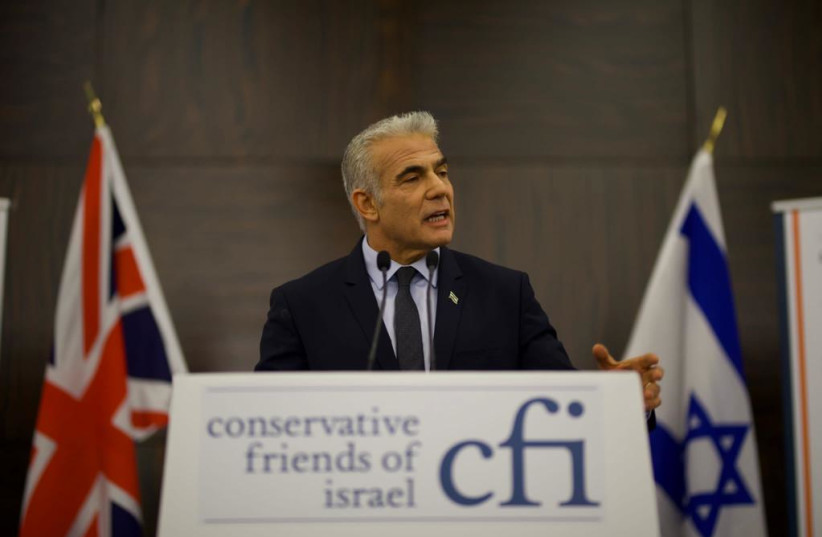Lifting sanctions on Iran could lead to military action by Israel, officials in Jerusalem warned world powers, as negotiations to curb the Islamic Republic’s nuclear program continued on Tuesday.
If the US lifts sanctions – along with international sanctions soon to be lifted under the terms of the 2015 nuclear deal – Iran could reach the nuclear threshold within six months, Israel has warned.
At that point, Israel could find it necessary to take unilateral action.
Foreign Minister Yair Lapid called for the world to ramp up the threat to Iran in order to deter it from developing a nuclear weapon.
In a meeting with French President Emmanuel Macron, Lapid emphasized that Israel views the talks as an attempt by Tehran to stall as it advances its nuclear program, and the world must have a plan B.

“Sanctions must not be lifted from Iran,” Lapid said. “Sanctions must be tightened. A real military threat must be put before Iran, because that is the only way to stop its race to become a nuclear power.”
The meeting with Macron came a day after Lapid relayed a similar message in a meeting with UK Prime Minister Boris Johnson. Defense Minister Benny Gantz plans to fly to Washington next week to discuss the nuclear threat, as well.
Nuclear talks continued on Tuesday, after world powers and Iran reconvened in Vienna on Monday for the first time since June, to negotiate an Iranian and American return to the 2015 Joint Comprehensive Plan of Action nuclear deal.
Israel opposes the JCPOA because it insufficiently limited Iran’s uranium enrichment, and, in fact, legitimizes further enrichment after the agreement expires, the so-called “sunset clause,” which paves the way for an eventual nuclear bomb. In addition, the JCPOA did not address Iran’s other malign actions in the region.
But worse than the JCPOA, Israeli officials say, would be an interim deal that would barely restrict Iran’s nuclear program.
Jerusalem has grown increasingly concerned that the US is considering such an agreement, which some diplomats have called “less for less.” It would have the US lift some sanctions in exchange for Iran freezing – but not rolling back – its nuclear program, which has advanced far beyond the JCPOA’s restrictions.
Foreign Ministry Director-General Alon Ushpiz said in an interview with KAN that this should be called “more for less,” as Iran would be getting a cash influx while conceding almost nothing.
Israel’s diplomatic efforts are overwhelmingly focused on the US, in order to convince Washington not to lift sanctions.
France, Germany and the UK have been sympathetic to Israel’s messages, a senior Israeli diplomatic source said this week, and Russia has been attentive. While there has been communication between China and Israel about the Iranian nuclear threat, Beijing has been less receptive.
Diplomats in the Vienna talks from the E3 – France, Britain and Germany – told Reuters on Tuesday that there will be a problem if Iran does not show this week that it is taking the negotiations seriously.
It remained unclear to the diplomats whether Iran would resume talks where they left off in June, when, they estimated, an agreement was 70%-80% complete.
The sides had yet to resolve the matter of Iran’s advanced centrifuges, used to enrich uranium.
As for reports that Iran is moving toward 90% enrichment of uranium – the level required for a nuclear weapon – the diplomats said that could endanger the talks, but cautioned that those reports are not confirmed.
Reaching an agreement is urgent, the diplomats said, but they did not want to impose an artificial deadline.
